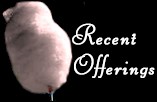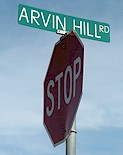The Art of Invisibility, Then and Now
1972. The clock in the living room chimes and cuckoos, reminding us every half-hour the oldest of my three brothers - the only one in the service - is no longer stationed in Germany. We have a color Polaroid of him and a couple of other guys standing in front of a truck with Blood, Sweat & Tires painted on the canvas cover.
I'm nine or ten, a fourth grader, looking for a book in the library at Rutherford Elementary School in Mesquite, Texas. The "V" section is small. High on a shelf is a thin, light green, cloth-covered hardback. I step up on the stool thinking perhaps there are other books I'm missing, but it is the only one, so I take it from the shelf and sit down at a table to see what I can learn.
There are lots of mountains, lots of deltas, and lots of people in funny hats eating lots of rice. I don't know what gross national product means, but it isn't what I want to know. The 1967 World Book Encyclopedia at home has the same information.
My shyness is debilitating and I am extremely reluctant to talk to anyone who doesn't adore me. I steel myself to approach the librarian sorting books on a cart.
"Is this the only book on Vietnam?"
She looks up and says "That's all there is," before returning her attention to the cart.
We are supposed to leave the books on the cart when we're done with them, but I take it with me as I walked back to the tiny, useless "V" section. I am baffled there is a war raging on the other side of the planet - I had a globe - and no mention of it anywhere in my school. Not in the classsroom. Not in the library.
That's all there is.
Why wasn't I allowed to know? Did they even know?
I climb the stool once again and return the thin, green hardback to its slot on the shelf. The only thing I learned was that I was on the receiving end of a lie.
Every afternoon at 5:30 p.m. Central Standard Time, a somber Walter Cronkite shows me what combat looks like.

Machine guns. Artillery. Black clouds. Gray smoke. Napalm. Exhaustion on the face every soldier and Marine standing, sitting or laying down, cigarettes dangling from their dirty faces. The dead and wounded - theirs and ours. Protests - here and there. Monks on fire. It was all on television. Every day. They are sickening images because war is sickening, and it doesn't matter whether you believe the war in Vietnam is a necessity, a criminal act or a horrible mistake. It doesn't matter whether you understand any of it. Seeing what is happening there makes everyone sick and sad and angry. The word hero does not spill out of every broadcast. The faces of the network anchors and correspondents are not jovial and carefree before, during or after they show us the horrors of the day. There is no small talk.
That isn't a problem today. Those who believe sacrificing members of their families on the altar of lies concocted by this administration and its surrogates - Republicans, Democrats and the nationalist press - don't have to be confronted with the ugliness of their loved ones' day to day, moment to moment reality. They don't have to see or read or hear anything that conflicts with their opinion. There are only heroes and bad apples. People "full of hate" for George W. Bush and The United States of America. People who hate freedom and everyone risking life and limb in its name.

My family never got the dreaded knock at the door. Bobby made it home in one piece. I didn't go to school that day. All these years later, I find myself wondering how often my mother and father thought that moment was closing in on them every time a friend, neighbor or relative would ring the doorbell or knock on the screen door.
Today, somewhere in America, a nervous kid gets out of a car and walks into a small, plain office with a couple of desks and framed posters of young men and women exuding health, happiness and a sense of purpose. Across town, a man in a uniform holds a flag in one hand and rings a doorbell with the other.
I'm nine or ten, a fourth grader, looking for a book in the library at Rutherford Elementary School in Mesquite, Texas. The "V" section is small. High on a shelf is a thin, light green, cloth-covered hardback. I step up on the stool thinking perhaps there are other books I'm missing, but it is the only one, so I take it from the shelf and sit down at a table to see what I can learn.
There are lots of mountains, lots of deltas, and lots of people in funny hats eating lots of rice. I don't know what gross national product means, but it isn't what I want to know. The 1967 World Book Encyclopedia at home has the same information.
My shyness is debilitating and I am extremely reluctant to talk to anyone who doesn't adore me. I steel myself to approach the librarian sorting books on a cart.
"Is this the only book on Vietnam?"
She looks up and says "That's all there is," before returning her attention to the cart.
We are supposed to leave the books on the cart when we're done with them, but I take it with me as I walked back to the tiny, useless "V" section. I am baffled there is a war raging on the other side of the planet - I had a globe - and no mention of it anywhere in my school. Not in the classsroom. Not in the library.
That's all there is.
Why wasn't I allowed to know? Did they even know?
I climb the stool once again and return the thin, green hardback to its slot on the shelf. The only thing I learned was that I was on the receiving end of a lie.
Every afternoon at 5:30 p.m. Central Standard Time, a somber Walter Cronkite shows me what combat looks like.

Machine guns. Artillery. Black clouds. Gray smoke. Napalm. Exhaustion on the face every soldier and Marine standing, sitting or laying down, cigarettes dangling from their dirty faces. The dead and wounded - theirs and ours. Protests - here and there. Monks on fire. It was all on television. Every day. They are sickening images because war is sickening, and it doesn't matter whether you believe the war in Vietnam is a necessity, a criminal act or a horrible mistake. It doesn't matter whether you understand any of it. Seeing what is happening there makes everyone sick and sad and angry. The word hero does not spill out of every broadcast. The faces of the network anchors and correspondents are not jovial and carefree before, during or after they show us the horrors of the day. There is no small talk.
That isn't a problem today. Those who believe sacrificing members of their families on the altar of lies concocted by this administration and its surrogates - Republicans, Democrats and the nationalist press - don't have to be confronted with the ugliness of their loved ones' day to day, moment to moment reality. They don't have to see or read or hear anything that conflicts with their opinion. There are only heroes and bad apples. People "full of hate" for George W. Bush and The United States of America. People who hate freedom and everyone risking life and limb in its name.

My family never got the dreaded knock at the door. Bobby made it home in one piece. I didn't go to school that day. All these years later, I find myself wondering how often my mother and father thought that moment was closing in on them every time a friend, neighbor or relative would ring the doorbell or knock on the screen door.
Today, somewhere in America, a nervous kid gets out of a car and walks into a small, plain office with a couple of desks and framed posters of young men and women exuding health, happiness and a sense of purpose. Across town, a man in a uniform holds a flag in one hand and rings a doorbell with the other.















<< Home